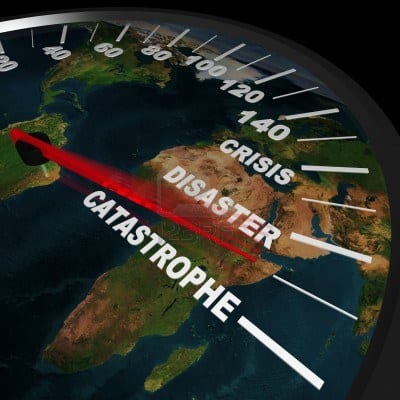Climate change is often characterised as a ‘crisis,’ but should it be more accurately understood as a ‘catastrophe’? This is a question that colleagues Christian De Cock, Daniel Nyberg and Sheena Vachhani and I explored at the recent Critical Management Studies conference at the University of Manchester, in a stream with the somewhat mischievous title “We’re F*cked! Conceptualising Catastrophe.”
The inspiration for this came from Stephen Emmott’s recent sell-out play 10 Billion. At the end of the performance, having reviewed the different ways in which humanity has altered Earth’s climate, the Oxford professor (and expert in complex natural systems) states ‘I think we’re already f*cked’. This is a sentiment that has been surfaced by others, including US geophysicist Brad Werner in a conference paper last year.
Indeed, short of the expletive, the theme of humanity’s suicidal trajectory in the Anthropocene has been emphasised by writers such as Clive Hamilton, Mark Lynas and George Monbiot. This has been reinforced with increasing urgency by scientists around the world, with US climate scientist James Hansen recently arguing that “conceivable levels of human-made climate forcing could yield the low-end runaway greenhouse’ including ‘out-of-control amplifying feedbacks such as ice sheet disintegration and melting of methane hydrates.”
Our conference stream on ‘catastrophe’ extended beyond climate change, exploring subjects as diverse as the disintegration of daily life, and perceptions of the global financial crisis. However, papers also explored deeper issues of what we mean by ‘catastrophe’ and its implications for humanity’s future.
For instance, several speakers flagged the distinction between ‘crisis’ and ‘catastrophe’, in that ‘crisis’ implies choice; ‘forks in the road’ by which we can shape future outcomes. By contrast, ‘catastrophe’ denotes the end itself. Other speakers highlighted how it is often difficult to comprehend or know when one is in a ‘catastrophe’ until it is too late (again strong parallels with the dithering and obfuscation that characterises the political debate surrounding climate change).
‘Catastrophe’ can also be an important mechanism for the mobilisation of political action. For instance, one of the papers in the stream explored how the Australian mining industry had conducted an extremely successful media campaign against the proposed mining super-profits tax by arguing the tax would ‘destroy the economy’; a claim uncritically accepted by the mainstream media.
Interestingly, in the debate over climate change there has been a rejection of ‘bad news’ messaging and an argument that positive communication is more effective in changing public attitudes. Irrespective of the veracity of such arguments, claiming ‘it’s the end of the world!’ can be highly effective in mobilising a response in some situations, while in other contexts this receives a mere shrug of the shoulders.
Indeed, our reactions to ‘catastrophe’ are often highly ambivalent. On the one hand, we are appalled by cataclysmic events and the suffering they cause. And yet, in our visually-saturated world of 24-7 news, we are also mesmerised by the spectacle of catastrophe. In relation to climate change, the growing visibility of floods, bushfires, hurricanes and tornadoes provide both a horrifying and yet fascinating attraction.
Finally however, ‘catastrophe’ may also involve something more fundamental than the popular representation of the Hollywood disaster film (e.g. the planet-killing meteor crashing to Earth). As the German philosopher Walter Benjamin noted, rather than the cataclysmic event that changes everything, ‘catastrophe’ may in fact be more simply the missed opportunity which preserves the status quo. This seems particularly relevant to climate change, in which humanity’s failure to divert from the path of ‘business as usual’ (despite numerous warnings) appears the ultimate catastrophe. As the marvellous Kurt Vonnegut declared in considering our apparently doomed future as a species:
“We probably could have saved ourselves, but were too damned lazy to try very hard…and too damn cheap.”
Christopher Wright is Professor of Organisational Studies at the University of Sydney Business School and Leader of the Balanced Enterprise Research Network (BERN), [email protected]










